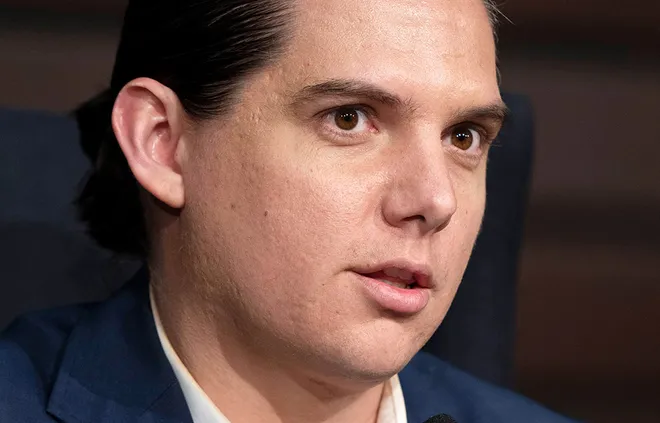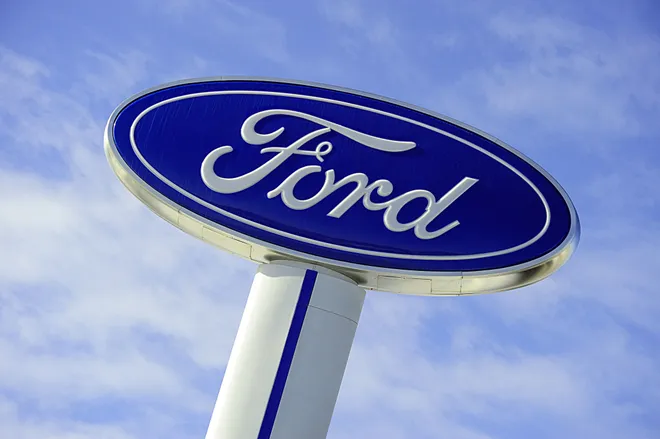Ford becomes latest high-profile American company to pump brakes on DEI
Ford Motor Co. told employees it will no longer participate in an annual survey from an LGBTQ advocacy group and would not use quotas for minority dealerships and suppliers, the latest company to make changes to its diversity, equity and inclusion initiatives as corporate America faces growing pressure from a conservative activist whose anti-DEI campaign is gaining momentum.
“We are mindful that our employees and customers hold a wide range of beliefs,” Ford CEO Jim Farley wrote in an internal email shared with USA TODAY by Robby Starbuck. “The external and legal environment related to political and social issues continues to evolve.”
When reached for comment, Ford told USA TODAY: "The communication to our global employees speaks for itself. We have nothing further to add."
Starbuck said he was investigating Ford’s DEI policies before the carmaker’s announcement. This week Starbuck claimed credit when home improvement chain Lowe’s scaled back DEI initiatives and he launched a campaign against Lowe's rival, Home Depot.
Ford said it will no longer take part in the Human Rights Campaign’s Corporate Equality Index and “best places to work” surveys. It also opened its employee resource groups to all workers. It was unclear how extensive the changes were to Ford’s overall DEI policies and programs.
“This isn’t everything we want but it’s a great start,” Starbuck wrote on X.
Human Rights Campaign President Kelley Robinson said the organization "could not be more disappointed to see Ford Motor Co. shirking its responsibility to its employees, consumers, and shareholders."
"By failing to support women leaders, employees of color, and LGBTQ+ employees, Ford Motor Co. is abandoning its financial duty to recruit and keep top talent from across the full talent pool," Robinson said in a statement. "In making their purchasing decisions, consumers should take note that Ford Motor Company has abandoned its commitment to our communities."
Lowe’s and Ford adopted preemptive changes before Starbuck rallied his social media followers to boycott the companies.
“We’re now forcing multibillion-dollar organizations to change their policies without even posting just from fear they have of being the next company that we expose,” he said.

Starbuck told USA TODAY he does not release details of his campaigns ahead of time, but “incremental change” like at Ford “will not affect our focus on pursuing larger change.”
Activists harness anti-DEI backlash
In a nation riven by cultural issues around race, gender and family, Starbuck belongs to a new wave of agitators pressuring corporate America to back off commitments to DEI, climate change and issues affecting LGBTQ+ people.
Emboldened by a Supreme Court decision last year banning affirmative action at the college level, conservative activists like anti-affirmative action crusader Edward Blum and former Trump administration official Stephen Miller have taken aim at the private sector with a wave of legal challenges against companies, government agencies and nonprofits.
Corporate diversity database:A USA TODAY investigative series inside the nation’s most powerful companies
Starbuck turns to his nearly 600,000 X followers to generate outrage and put pressure on corporations.

A series of companies including Tractor Supply, John Deere, Harley-Davidson and Jack Daniel’s whiskey maker Brown-Forman have made changes to DEI programs after scrutiny from Starbuck.
Farley sits on Harley-Davidson’s board. John Deere CEO John May sits on Ford’s board.
Why some companies pull the plug on DEI
Publicly, most business leaders who made commitments following the 2020 murder of George Floyd say they remain dedicated to DEI. But privately, they are scrutinizing DEI investments and backing away from initiatives like hiring targets conservatives claim are illegal quotas.
Fellowships and internships that once were open only to historically underrepresented groups are now increasingly open to everyone. A growing number of companies have dropped mentions of diversity goals in shareholder reports. Some even list DEI as a “risk factor” in regulatory filings.
Diversity advocates say business leaders are trying to steer away from the nation’s cultural fault lines while continuing to embrace DEI initiatives that are popular with many consumers and employees.
Driving that shift is the charged political climate in the run-up to the 2024 election.
If he wins the White House, GOP nominee Donald Trump has promised to reverse the Biden administration’s “woke equity” programs.
J.D. Vance, the GOP senator from Ohio who is Trump’s running mate, introduced a bill – the “Dismantle DEI Act” – that would end all federal DEI programs and funding for government agencies and contractors that have DEI programs.
Increasingly, Americans are indicating they would prefer businesses stay out of public policy.
Fewer than 4 in 10 U.S. adults (38%) believe businesses should take public stances, a decline of 10 percentage points since 2022, according to a recent survey from Gallup and Bentley University.
The only groups to express majority support for businesses taking public stands are LGBTQ+ adults (55%), Black adults (54%) and Democrats (53%), the Bentley-Gallup Business in Society Report found.
DEI is political wedge issue in 2024 election
In this volatile political environment, Starbuck sees himself as a corporate watchdog. He frames his campaign as getting politics out of business.
He credits his success to targeting brands with broad appeal among conservatives that he says have fallen “out of alignment” with their customers.
Tractor Supply, his first target, ended its DEI programs while the other companies did not make wholesale changes.
“When a company does a full turnaround like Tractor Supply, then we very strongly support people rewarding those types of companies,” Starbuck told USA TODAY.
Diversity advocates argue that DEI initiatives are popular in corporate America because they drive business success.
A recent study from the Global Black Economic Forum and the Korn Ferry Institute found that building diverse teams and inclusive workplaces boosts innovation and other business goals.
“Opponents of DEI seek to dismantle initiatives because they work,” Andrea Abrams, executive director of Defending American Values Coalition, a member of the Stacey Abrams-founded American Pride Rises Network, said in a statement. “Rather than bowing to the pressures of anti-DEI activists, companies should speak up about the economic successes of DEI and stand firm in their support for programs that increase the talent pool and expand the bottom line.”
With anti-DEI rhetoric catching fire in conservative-leaning corners of the internet and talk of "woke mind virus" from prominent business figures like Elon Musk, Shaun Harper, a professor of business, public policy and education at the University of Southern California, says companies must be more transparent about their efforts to make their workforce and leadership better reflect the customers they serve.
“It demands companies show their work and show that their work is not the outrageous, divisive, indoctrinating versions of DEI that are talked about on Fox News and in other conservative media outlets and on conservative social media,” Harper said.
Disclaimer: The copyright of this article belongs to the original author. Reposting this article is solely for the purpose of information dissemination and does not constitute any investment advice. If there is any infringement, please contact us immediately. We will make corrections or deletions as necessary. Thank you.







